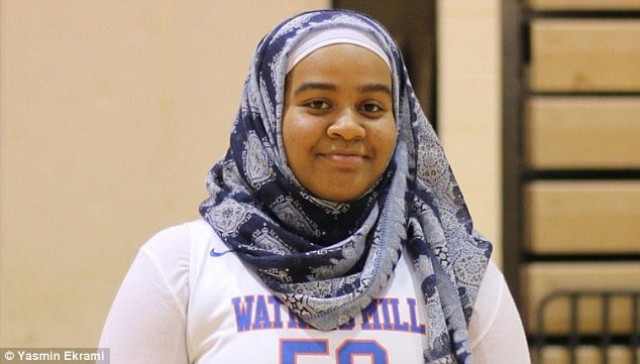Muslim teen barred from basketball game because of her hijab
Je’Nan previously played 24 games of season without facing any objection from school or coach

Je'Nan Hayes
PHOTO: DAILYMAIL
Je’Nan Hayes, a high school junior, was told by the head official of a rule in the National Federation of State High School Association rule-book that requires a state-signed waiver to allow covering her head.
Je’Nan has previously played 24 games of the season without facing any objection from the school or coach.
"I felt discriminated against, and I didn't feel good at all," Je’Nan said. "If it was some reason like my shirt wasn't the right color or whatever, then I'd be like, `Okay.' But because of my religion it took it to a whole different level, and I just felt that it was not right at all."
Nike unveils Pro Hijab for Muslim athletes
Her coach, Donita Adams, who was unaware of the rule until a night before, waited for the game to be over before informing Hayes.
"I didn't even want to look down at Je'Nan in that moment," Adams said. "I had not yet told her that she wasn't allowed to play in the game because of her headscarf."
After the team lost to Oxon Hill, Adams took Hayes aside to apologise and explain the reason she did not get to play in the game.
The rule states that "for religious reasons — In the event there is documented evidence provided to the state association that a participant may not expose his/her uncovered head, the state association may approve a covering or wrap which is not abrasive, hard or dangerous to any other player and which is attached in such a way it is highly unlikely it will come off during play."
While the referees were correct in asking for a state-signed waiver, the administrators from Prince George’s County and Maryland Public Secondary School Athletic Association did not approve of the ruling.
"The officials of the game there took a strict interpretation of the rule, instead of the spirit of the rule," said Andy Warner, executive director of the MPSSAA. "Does this fundamentally alter the game? Does this create an inherent risk? Does it create a competitive advantage?"
"It doesn't do any of those things, so why are we denying what would be approved if they were to put a simple request into the association?” she asked.
Hijab-clad models walk ramp at Tokyo Modest Fashion Show
Her stance was supported by the county’s athletic director, Earl Hawkins who believed that the referees made a mistake in not letting Hayes play. "Everybody has apologised. If the situation happens again, we'll deal with it in a better fashion, much better fashion," he said.
Je’Nan’s mother, Carlitta Foster-Haye, Warner and Adams echoed the same opinion that a headscarf should not need documentation. "It's almost like you're singling out different religions, you know?" Foster-Hayes said. "With the way the rule is, you have to take an extra step to play because you're Muslim."
While the MPSSAA and referees association apologised to Je’Nan and her family, the Hayes’ are set to challenge the rule.
"I just want to be an advocate for boys or girls, anybody who is trying out for a sport and has a religion and they feel like their faith can interfere with the way they play sports," Je’Nan said. "It shouldn't be that way. And because of rules like these, I feel like it makes people scared or turn away from sports, and I don't want that to happen to anybody else in the future."
"I know definitely next year I'm going to try out for basketball," she stressed. "It does not stop here."
This article originally appeared in the NBC Washington.



















COMMENTS
Comments are moderated and generally will be posted if they are on-topic and not abusive.
For more information, please see our Comments FAQ